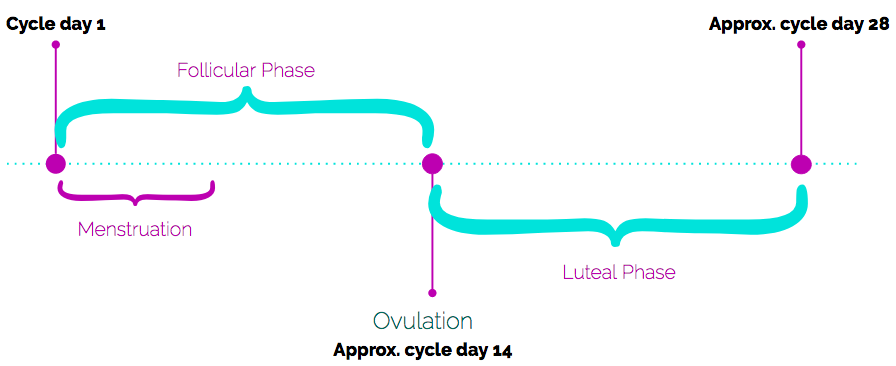The 4 Phases of the Menstrual Cycle
If you are trying to conceive, starting to chart your cycle, or if you just want a better understanding of the changes your body undergoes each month, understanding the 4 main phases of the menstrual cycle is a good place to start. Unfortunately there is a ton of confusion about these phases, when they happen, and what each means, especially for women with irregular cycles. But I'm here to break it all down for you!
Menstruation
Each cycle starts with the first day of full flow, otherwise known as cycle day 1.
A note on spotting: if you are prone to spotting (light bleeding that happens before or after the period, or it may happen between periods) this does not count as full flow and therefore does not count as the start of a new cycle. Unless spotting/a very light flow is a normal period for you, do not count cycle day 1 until you get a full flow.
What's happening with hormones
Your period is initiated by a drop off in estrogen and progesterone which causes the uterine lining to shed. Each day into the new cycle estrogen and follicle stimulating hormone slowly build back up to stimulate eggs growing in the ovaries.
How you'll feel
For many women who are prone to feeling sensitive and irritable before their period, this drop in hormones on cycle day 1 feels like a release valve, an instant relief once their period starts. Depending on the degree of bleeding and/or cramping, energy may be low during the first few days of the cycle, some women feel completely wiped out or deal with a lot of cramping pain. Many women feel more intuitive and tapped into their creativity during their menstrual phase. it's a good time to journal, meditate, rest.
How to support
Take. It. Easy. Do not overdo it on the first few days of your cycle, especially if you are prone to pain and heavy bleeding. Don't feel bad about skipping a workout or flaking on a social engagement. If you take the time to rest and restore during this phase, you're setting yourself up for a much more pleasant cycle the rest of the month.
After losing blood, it's a good idea to eat nourishing food to help your body rebuild. Blood building foods include: dark leafy greens, beets, raspberry leaf tea, berries, nutritional yeast, micro-algae such as spirulina, bone broth, a small/moderate amount of grassfed beef or lamb, and pasture-raised dark meat chicken.
If you are prone to heavy bleeding and/or cramping, I recommend drinking Raspberry Leaf Tea throughout the month and trying my Crimson Companion herbal tincture and Cramp Calmer herbal balm during your heaviest days of bleeding and/or cramping.
Follicular Phase
The follicular phase it the first half of the cycle, from menstruation to ovulation. It's name refers to the follicles, which contain eggs, that are developing in the ovaries in preparation for ovulation. There is some confusion because the follicular phase includes menstruation (see the chart at the top of this post.)
What's happening with hormones
Much of the follicular phase is dominated by estrogen, it slowly builds back up once the cycle restarts because it's released by the developing follicles in the ovaries. Estrogen in turn builds up the uterine lining, the endometrium, again.
How you'll feel
After menstruation is over your energy, motivation, and even confidence usually rise along with estrogen levels. I call this "the happy phase" because it usually feels the best of the whole cycle. Even though energy and mood may feel great, if you're prone to hormone imbalances you may experience symptoms such as hot flashes or night sweats during this phase.
How to support
Since you're probably feeling pretty good during this phase, ride that wave and use it to get work done, exercise, and be social. If you are still feeling low energy after a heavy bleed, continue to eat blood building foods during this phase.
If you are prone to hot flashes and/or night sweats during this phase then incorporate more Yin nourishing foods which includes: most vegetables, especially root vegetables, fish, melon, apples, pears - and make sure to avoid "hot" foods that can make your symptoms worse: spicy foods, alcohol, chocolate, fried foods, processed foods, and large amounts of red meat.
Ovulation
Ovulation itself happens in a moment, and it's actually the moment the follicular phase flips over to the luteal phase. But the days surrounding ovulation, also known as the ovulatory phase, carry unique characteristics that are different than the rest of the cycle.
Estimated as cycle 14, ovulation can actually occur much earlier or later in the cycle, especially if you don't have a 28 day cycle. If you have trouble figuring out when you are ovulating, use ovulation predictor kits (OPKs) to pinpoint your peak day, especially if you are trying to conceive and need to know when to time intercourse. Some cycle charting apps try to estimate when you are ovulating based on the length of your cycle, but depending on your pattern, their estimation may be wildly incorrect.
What's happening with hormones
Estrogen peaks as well as something called luteinizing hormone, which signals an egg to be released from one of the ovaries. The ovulation predictor kits mentioned above test for luteinizing hormone in your urine and they are a fairly accurate way to determine when you're ovulating.
How you'll feel
Many people feel energetic and in good spirits around ovulation, while others can feel irritable or have some cramping during this phase that feels similar to menstrual cramps, but they don't last quite as long. Generally libido rises and cervical fluid (clear and stringy discharge) increases, this is a sign of peak fertility and usually happens on the day you ovulate or 1-2 days before.
How to support
How to support yourself during this phase wholly depends on how you're feeling. If you are feeling great, then like earlier in the follicular phase, use this time to exercise, get work done, and socialize. If you are feeling irritable or low energy, then take it easy and give yourself a break for a few days until the peak in hormones settles down.
Luteal Phase
The luteal phase is the opposite of the follicular phase, it consists of the second half of the cycle from ovulation to menstruation. If you're trying to conceive this is the phase when implantation and pregnancy could potentially occur. It's also the time when PMS is experienced, if you are prone to it.
Typically the end of the cycle (when the period starts again) is about 2 weeks after ovulation, so if you ovulate on cycle day 14 then you'll probably get your period again around cycle day 28. If you ovulate much earlier or later than cycle day 14, your cycle may be shorter or longer than the standard estimation of 28 days.
What's happening with hormones
As soon as an egg is released from the ovaries the follicle it was released from transforms into a temporary progesterone-producing structure called a luteal body - this is where the luteal phase gets its name. The luteal body continues to make progesterone for about about 2 weeks, which causes the uterine lining to remain stable and keeps the uterus a few degrees warmer (you'll notice this if you take your basal body temperature to chart your cycle.)
Estrogen is also produced, but in smaller amounts than in the follicular phase, so progesterone is said to dominate the luteal phase. Some PMS symptoms, however, may be caused by excess estrogen during the this phase.
If pregnancy occurs, the growing embryo signals the ovaries to keep making progesterone until the placenta can take over that task. This keeps the period from starting before pregnancy can become established. If pregnancy does not occur, then luteal body naturally stops working, progesterone and estrogen levels drop off, and the cycle re-starts.
How you'll feel
It's common for energy levels and libido to be lower during this phase, especially in the week prior to bleeding. It's also common for mood to change, sometimes drastically, during the luteal phase. Irritability and weepiness are especially common, along with breast tenderness, changes to digestion, muscle tension, and possibly changes to temperature regulation, causes a warm sensation in the body.
How to support
Even though energy levels are lower during the luteal phase, exercise can still be beneficial as it helps to release endorphins and supports the liver to clear out excess hormones from the system. Even though libido is low, have sex or masterbating may also be helpful for improving mood tension in the body.
If you are prone to PMS, I recommend trying my Peaceful Period herbal tincture and Chill Out Tea blend. The Dandelion Detox supports the liver to metabolize excess hormones from the system and reduces symptoms of PMS and my Chill Out Tea is a gentle blend of relaxing herbs that nourish anxious or irritable nervous systems.
For those trying to conceive, an embryo may be developing during this phase. Take the usual precautions of pregnancy, such as avoiding alcohol, smoking, medications that aren't safe in pregnancy, hot tubs/baths, x-rays, and dental work. You can also focus on eating foods that support implantation.
Want to learn more?
I offer a free email course Happier Hormones in 30 Days, which gives you practical and useable advise on how to naturally balance your hormones.







